PROJ 6000: Reflective Learning on Project Management Principles
VerifiedAdded on 2023/03/23
|8
|2004
|37
Journal and Reflective Writing
AI Summary
This document presents a student's reflective journal on the principles of project management, covering six modules of learning. The reflection begins with an understanding of fundamental project management principles, the role of a project manager, and various project management methodologies. It progresses through discussions on project management standards (PMBOK and PRINCE2), project lifecycles, and project initiation processes, emphasizing the importance of business cases and stakeholder expectations. Further modules delve into project selection methods, statement of work (SOW), lifecycle models (traditional, agile, extreme, and Emertxe), and the influence of organizational structures and cultures. The journal then highlights the ten project management knowledge areas, including integration, stakeholder, procurement, risk, communication, resource, quality, cost, schedule, and scope management. It concludes with reflections on project success and failure factors, drawing from industry examples, and emphasizes the importance of continuous learning and skill development for a successful career as a project manager. Desklib offers more resources like this to aid students in their studies.
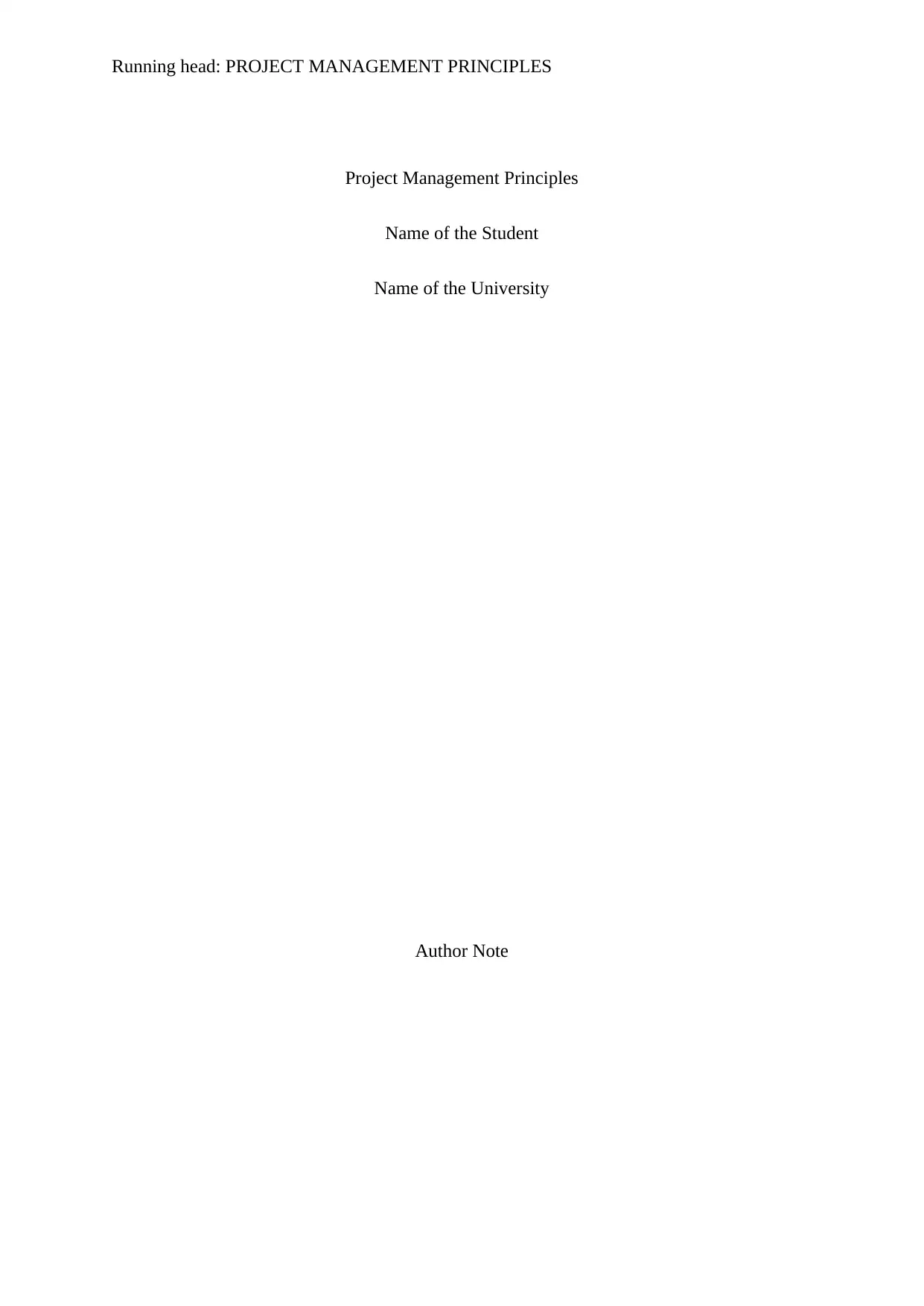
Running head: PROJECT MANAGEMENT PRINCIPLES
Project Management Principles
Name of the Student
Name of the University
Author Note
Project Management Principles
Name of the Student
Name of the University
Author Note
Paraphrase This Document
Need a fresh take? Get an instant paraphrase of this document with our AI Paraphraser
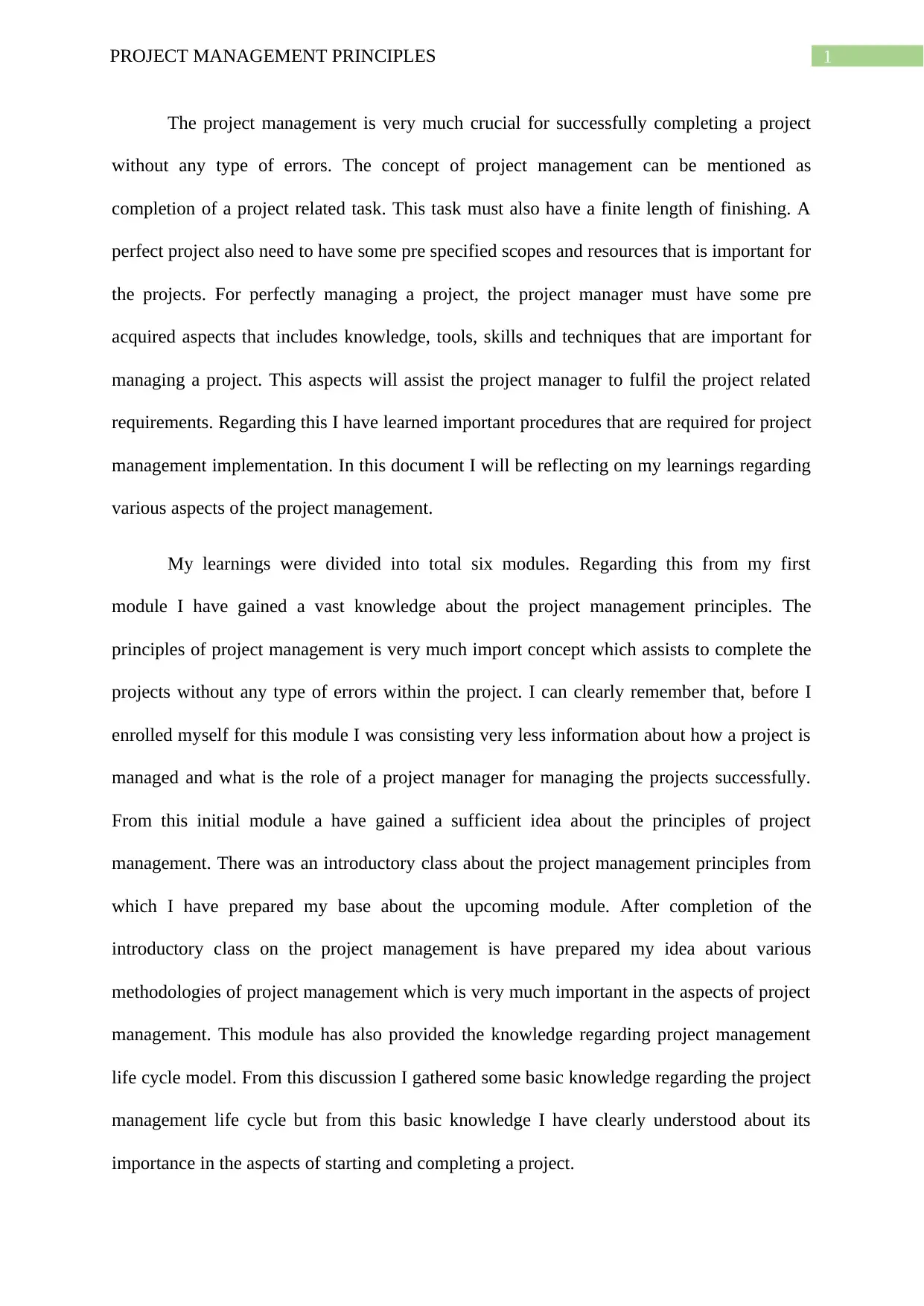
1PROJECT MANAGEMENT PRINCIPLES
The project management is very much crucial for successfully completing a project
without any type of errors. The concept of project management can be mentioned as
completion of a project related task. This task must also have a finite length of finishing. A
perfect project also need to have some pre specified scopes and resources that is important for
the projects. For perfectly managing a project, the project manager must have some pre
acquired aspects that includes knowledge, tools, skills and techniques that are important for
managing a project. This aspects will assist the project manager to fulfil the project related
requirements. Regarding this I have learned important procedures that are required for project
management implementation. In this document I will be reflecting on my learnings regarding
various aspects of the project management.
My learnings were divided into total six modules. Regarding this from my first
module I have gained a vast knowledge about the project management principles. The
principles of project management is very much import concept which assists to complete the
projects without any type of errors within the project. I can clearly remember that, before I
enrolled myself for this module I was consisting very less information about how a project is
managed and what is the role of a project manager for managing the projects successfully.
From this initial module a have gained a sufficient idea about the principles of project
management. There was an introductory class about the project management principles from
which I have prepared my base about the upcoming module. After completion of the
introductory class on the project management is have prepared my idea about various
methodologies of project management which is very much important in the aspects of project
management. This module has also provided the knowledge regarding project management
life cycle model. From this discussion I gathered some basic knowledge regarding the project
management life cycle but from this basic knowledge I have clearly understood about its
importance in the aspects of starting and completing a project.
The project management is very much crucial for successfully completing a project
without any type of errors. The concept of project management can be mentioned as
completion of a project related task. This task must also have a finite length of finishing. A
perfect project also need to have some pre specified scopes and resources that is important for
the projects. For perfectly managing a project, the project manager must have some pre
acquired aspects that includes knowledge, tools, skills and techniques that are important for
managing a project. This aspects will assist the project manager to fulfil the project related
requirements. Regarding this I have learned important procedures that are required for project
management implementation. In this document I will be reflecting on my learnings regarding
various aspects of the project management.
My learnings were divided into total six modules. Regarding this from my first
module I have gained a vast knowledge about the project management principles. The
principles of project management is very much import concept which assists to complete the
projects without any type of errors within the project. I can clearly remember that, before I
enrolled myself for this module I was consisting very less information about how a project is
managed and what is the role of a project manager for managing the projects successfully.
From this initial module a have gained a sufficient idea about the principles of project
management. There was an introductory class about the project management principles from
which I have prepared my base about the upcoming module. After completion of the
introductory class on the project management is have prepared my idea about various
methodologies of project management which is very much important in the aspects of project
management. This module has also provided the knowledge regarding project management
life cycle model. From this discussion I gathered some basic knowledge regarding the project
management life cycle but from this basic knowledge I have clearly understood about its
importance in the aspects of starting and completing a project.
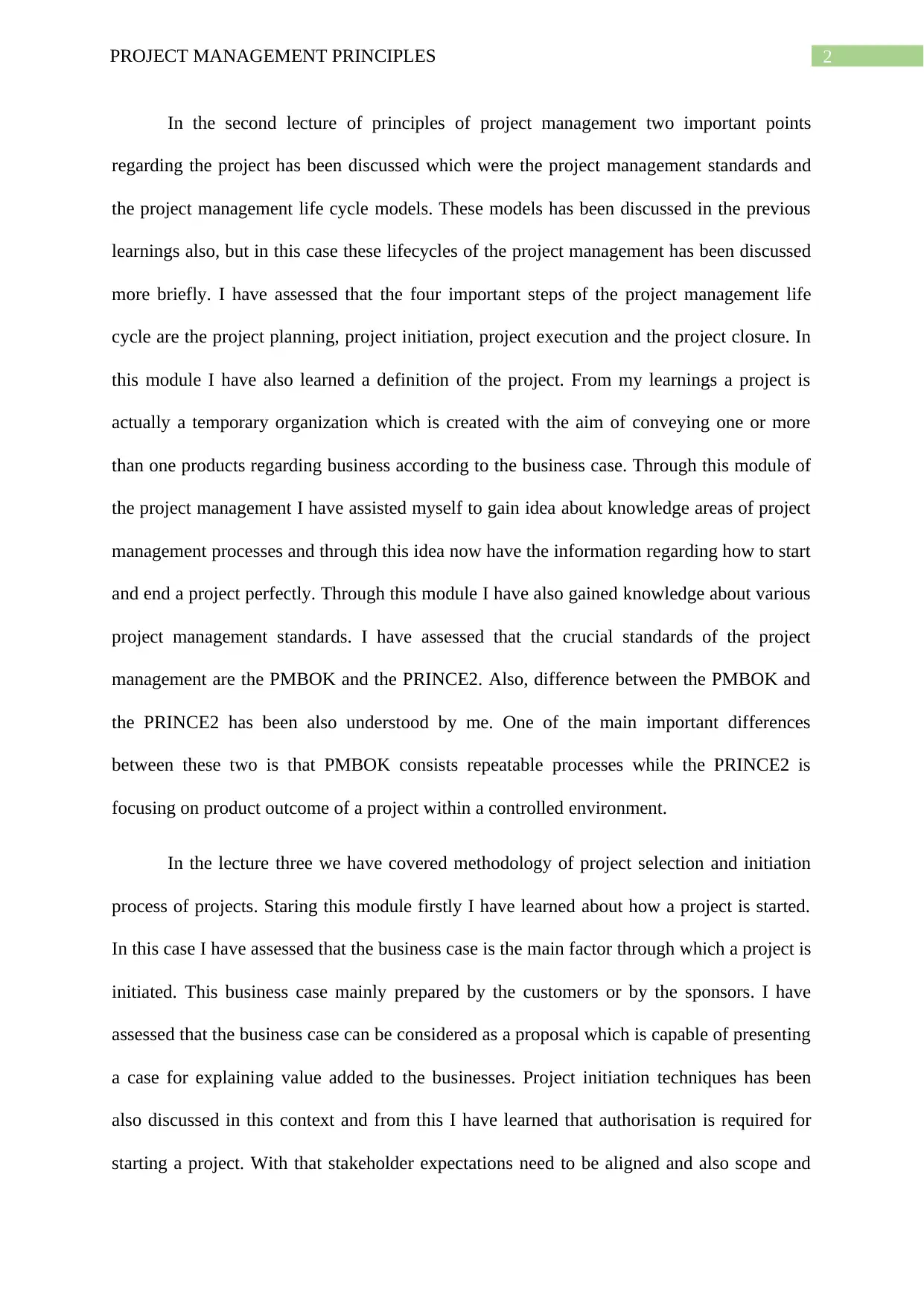
2PROJECT MANAGEMENT PRINCIPLES
In the second lecture of principles of project management two important points
regarding the project has been discussed which were the project management standards and
the project management life cycle models. These models has been discussed in the previous
learnings also, but in this case these lifecycles of the project management has been discussed
more briefly. I have assessed that the four important steps of the project management life
cycle are the project planning, project initiation, project execution and the project closure. In
this module I have also learned a definition of the project. From my learnings a project is
actually a temporary organization which is created with the aim of conveying one or more
than one products regarding business according to the business case. Through this module of
the project management I have assisted myself to gain idea about knowledge areas of project
management processes and through this idea now have the information regarding how to start
and end a project perfectly. Through this module I have also gained knowledge about various
project management standards. I have assessed that the crucial standards of the project
management are the PMBOK and the PRINCE2. Also, difference between the PMBOK and
the PRINCE2 has been also understood by me. One of the main important differences
between these two is that PMBOK consists repeatable processes while the PRINCE2 is
focusing on product outcome of a project within a controlled environment.
In the lecture three we have covered methodology of project selection and initiation
process of projects. Staring this module firstly I have learned about how a project is started.
In this case I have assessed that the business case is the main factor through which a project is
initiated. This business case mainly prepared by the customers or by the sponsors. I have
assessed that the business case can be considered as a proposal which is capable of presenting
a case for explaining value added to the businesses. Project initiation techniques has been
also discussed in this context and from this I have learned that authorisation is required for
starting a project. With that stakeholder expectations need to be aligned and also scope and
In the second lecture of principles of project management two important points
regarding the project has been discussed which were the project management standards and
the project management life cycle models. These models has been discussed in the previous
learnings also, but in this case these lifecycles of the project management has been discussed
more briefly. I have assessed that the four important steps of the project management life
cycle are the project planning, project initiation, project execution and the project closure. In
this module I have also learned a definition of the project. From my learnings a project is
actually a temporary organization which is created with the aim of conveying one or more
than one products regarding business according to the business case. Through this module of
the project management I have assisted myself to gain idea about knowledge areas of project
management processes and through this idea now have the information regarding how to start
and end a project perfectly. Through this module I have also gained knowledge about various
project management standards. I have assessed that the crucial standards of the project
management are the PMBOK and the PRINCE2. Also, difference between the PMBOK and
the PRINCE2 has been also understood by me. One of the main important differences
between these two is that PMBOK consists repeatable processes while the PRINCE2 is
focusing on product outcome of a project within a controlled environment.
In the lecture three we have covered methodology of project selection and initiation
process of projects. Staring this module firstly I have learned about how a project is started.
In this case I have assessed that the business case is the main factor through which a project is
initiated. This business case mainly prepared by the customers or by the sponsors. I have
assessed that the business case can be considered as a proposal which is capable of presenting
a case for explaining value added to the businesses. Project initiation techniques has been
also discussed in this context and from this I have learned that authorisation is required for
starting a project. With that stakeholder expectations need to be aligned and also scope and
⊘ This is a preview!⊘
Do you want full access?
Subscribe today to unlock all pages.

Trusted by 1+ million students worldwide
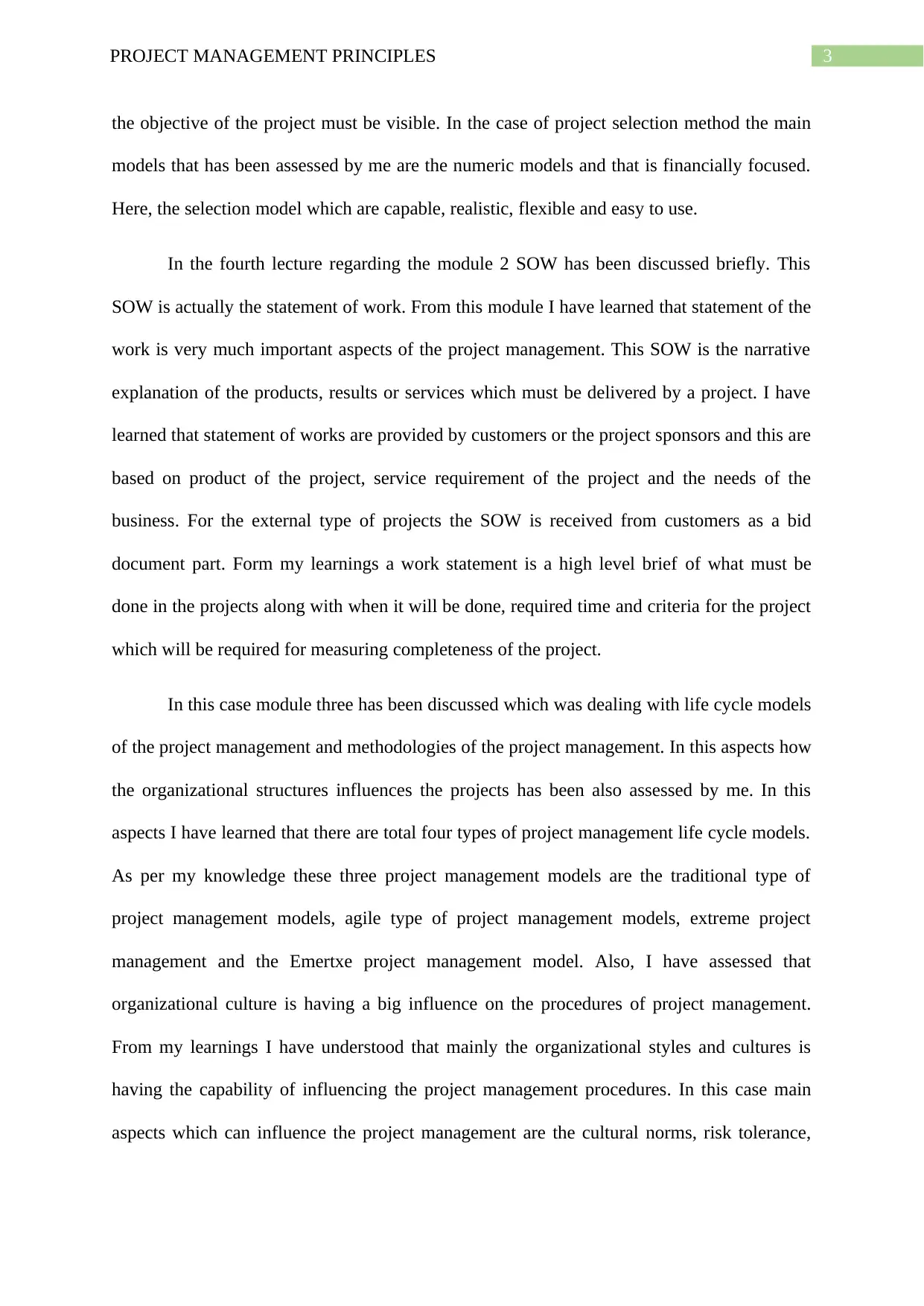
3PROJECT MANAGEMENT PRINCIPLES
the objective of the project must be visible. In the case of project selection method the main
models that has been assessed by me are the numeric models and that is financially focused.
Here, the selection model which are capable, realistic, flexible and easy to use.
In the fourth lecture regarding the module 2 SOW has been discussed briefly. This
SOW is actually the statement of work. From this module I have learned that statement of the
work is very much important aspects of the project management. This SOW is the narrative
explanation of the products, results or services which must be delivered by a project. I have
learned that statement of works are provided by customers or the project sponsors and this are
based on product of the project, service requirement of the project and the needs of the
business. For the external type of projects the SOW is received from customers as a bid
document part. Form my learnings a work statement is a high level brief of what must be
done in the projects along with when it will be done, required time and criteria for the project
which will be required for measuring completeness of the project.
In this case module three has been discussed which was dealing with life cycle models
of the project management and methodologies of the project management. In this aspects how
the organizational structures influences the projects has been also assessed by me. In this
aspects I have learned that there are total four types of project management life cycle models.
As per my knowledge these three project management models are the traditional type of
project management models, agile type of project management models, extreme project
management and the Emertxe project management model. Also, I have assessed that
organizational culture is having a big influence on the procedures of project management.
From my learnings I have understood that mainly the organizational styles and cultures is
having the capability of influencing the project management procedures. In this case main
aspects which can influence the project management are the cultural norms, risk tolerance,
the objective of the project must be visible. In the case of project selection method the main
models that has been assessed by me are the numeric models and that is financially focused.
Here, the selection model which are capable, realistic, flexible and easy to use.
In the fourth lecture regarding the module 2 SOW has been discussed briefly. This
SOW is actually the statement of work. From this module I have learned that statement of the
work is very much important aspects of the project management. This SOW is the narrative
explanation of the products, results or services which must be delivered by a project. I have
learned that statement of works are provided by customers or the project sponsors and this are
based on product of the project, service requirement of the project and the needs of the
business. For the external type of projects the SOW is received from customers as a bid
document part. Form my learnings a work statement is a high level brief of what must be
done in the projects along with when it will be done, required time and criteria for the project
which will be required for measuring completeness of the project.
In this case module three has been discussed which was dealing with life cycle models
of the project management and methodologies of the project management. In this aspects how
the organizational structures influences the projects has been also assessed by me. In this
aspects I have learned that there are total four types of project management life cycle models.
As per my knowledge these three project management models are the traditional type of
project management models, agile type of project management models, extreme project
management and the Emertxe project management model. Also, I have assessed that
organizational culture is having a big influence on the procedures of project management.
From my learnings I have understood that mainly the organizational styles and cultures is
having the capability of influencing the project management procedures. In this case main
aspects which can influence the project management are the cultural norms, risk tolerance,
Paraphrase This Document
Need a fresh take? Get an instant paraphrase of this document with our AI Paraphraser
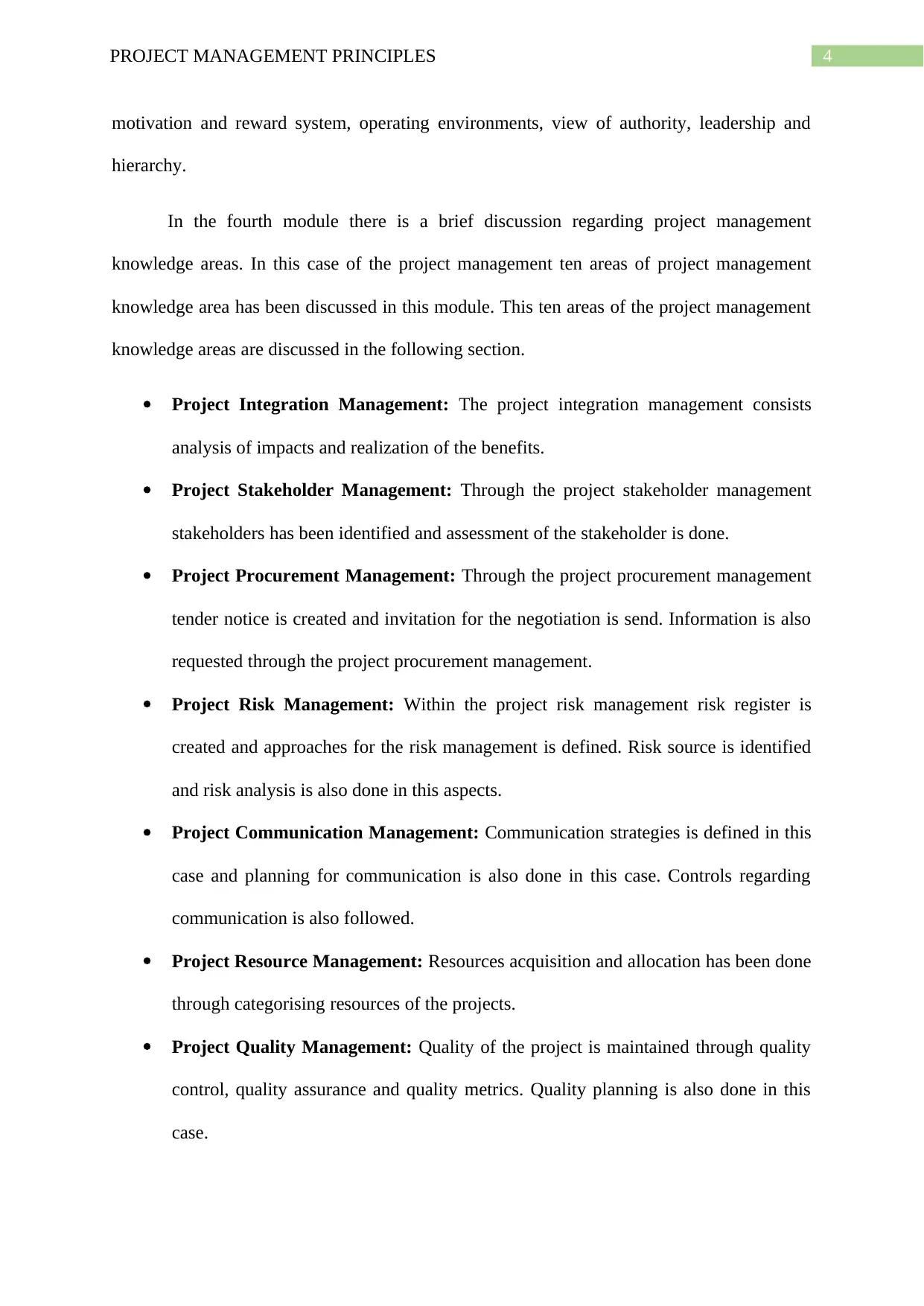
4PROJECT MANAGEMENT PRINCIPLES
motivation and reward system, operating environments, view of authority, leadership and
hierarchy.
In the fourth module there is a brief discussion regarding project management
knowledge areas. In this case of the project management ten areas of project management
knowledge area has been discussed in this module. This ten areas of the project management
knowledge areas are discussed in the following section.
Project Integration Management: The project integration management consists
analysis of impacts and realization of the benefits.
Project Stakeholder Management: Through the project stakeholder management
stakeholders has been identified and assessment of the stakeholder is done.
Project Procurement Management: Through the project procurement management
tender notice is created and invitation for the negotiation is send. Information is also
requested through the project procurement management.
Project Risk Management: Within the project risk management risk register is
created and approaches for the risk management is defined. Risk source is identified
and risk analysis is also done in this aspects.
Project Communication Management: Communication strategies is defined in this
case and planning for communication is also done in this case. Controls regarding
communication is also followed.
Project Resource Management: Resources acquisition and allocation has been done
through categorising resources of the projects.
Project Quality Management: Quality of the project is maintained through quality
control, quality assurance and quality metrics. Quality planning is also done in this
case.
motivation and reward system, operating environments, view of authority, leadership and
hierarchy.
In the fourth module there is a brief discussion regarding project management
knowledge areas. In this case of the project management ten areas of project management
knowledge area has been discussed in this module. This ten areas of the project management
knowledge areas are discussed in the following section.
Project Integration Management: The project integration management consists
analysis of impacts and realization of the benefits.
Project Stakeholder Management: Through the project stakeholder management
stakeholders has been identified and assessment of the stakeholder is done.
Project Procurement Management: Through the project procurement management
tender notice is created and invitation for the negotiation is send. Information is also
requested through the project procurement management.
Project Risk Management: Within the project risk management risk register is
created and approaches for the risk management is defined. Risk source is identified
and risk analysis is also done in this aspects.
Project Communication Management: Communication strategies is defined in this
case and planning for communication is also done in this case. Controls regarding
communication is also followed.
Project Resource Management: Resources acquisition and allocation has been done
through categorising resources of the projects.
Project Quality Management: Quality of the project is maintained through quality
control, quality assurance and quality metrics. Quality planning is also done in this
case.
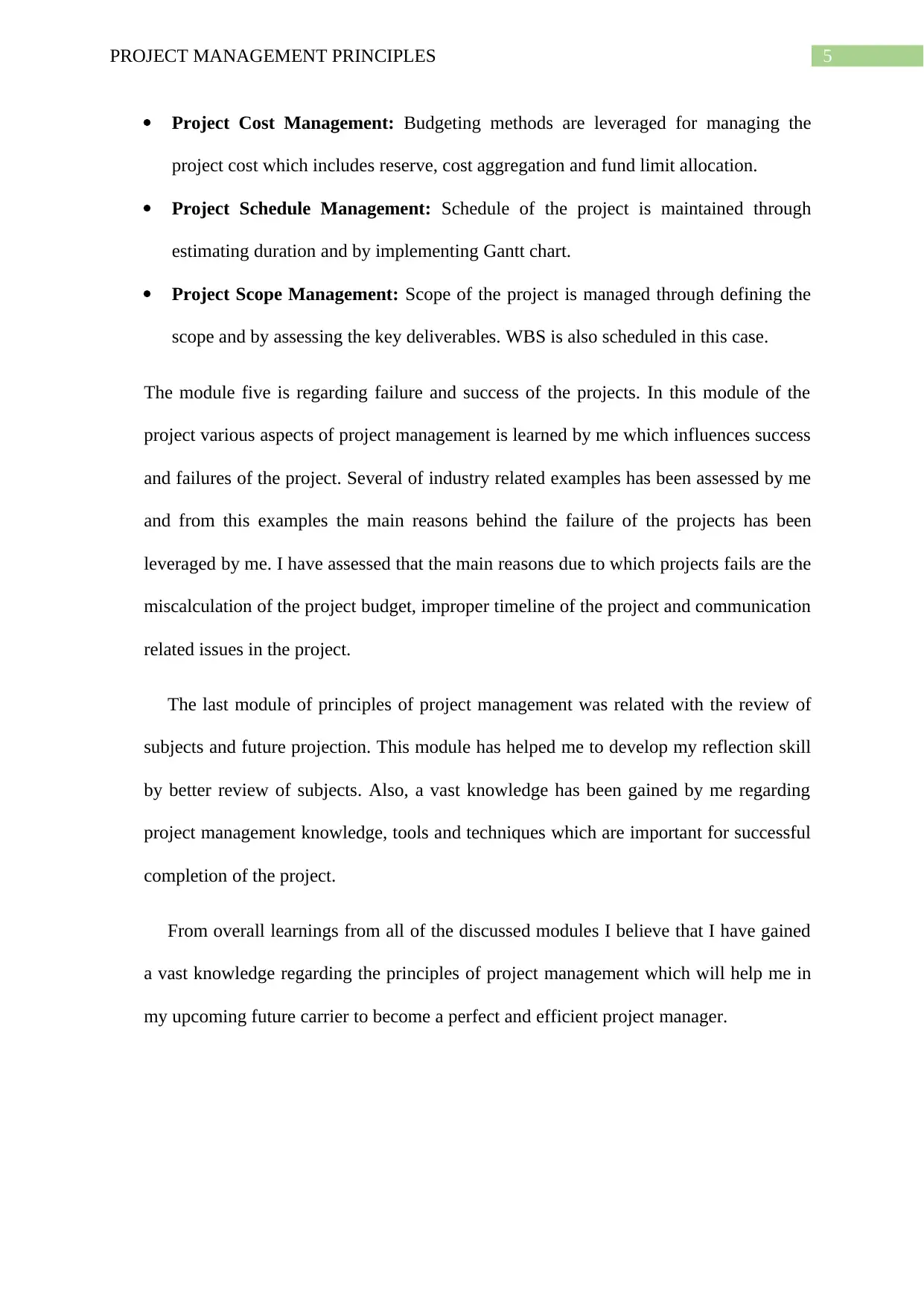
5PROJECT MANAGEMENT PRINCIPLES
Project Cost Management: Budgeting methods are leveraged for managing the
project cost which includes reserve, cost aggregation and fund limit allocation.
Project Schedule Management: Schedule of the project is maintained through
estimating duration and by implementing Gantt chart.
Project Scope Management: Scope of the project is managed through defining the
scope and by assessing the key deliverables. WBS is also scheduled in this case.
The module five is regarding failure and success of the projects. In this module of the
project various aspects of project management is learned by me which influences success
and failures of the project. Several of industry related examples has been assessed by me
and from this examples the main reasons behind the failure of the projects has been
leveraged by me. I have assessed that the main reasons due to which projects fails are the
miscalculation of the project budget, improper timeline of the project and communication
related issues in the project.
The last module of principles of project management was related with the review of
subjects and future projection. This module has helped me to develop my reflection skill
by better review of subjects. Also, a vast knowledge has been gained by me regarding
project management knowledge, tools and techniques which are important for successful
completion of the project.
From overall learnings from all of the discussed modules I believe that I have gained
a vast knowledge regarding the principles of project management which will help me in
my upcoming future carrier to become a perfect and efficient project manager.
Project Cost Management: Budgeting methods are leveraged for managing the
project cost which includes reserve, cost aggregation and fund limit allocation.
Project Schedule Management: Schedule of the project is maintained through
estimating duration and by implementing Gantt chart.
Project Scope Management: Scope of the project is managed through defining the
scope and by assessing the key deliverables. WBS is also scheduled in this case.
The module five is regarding failure and success of the projects. In this module of the
project various aspects of project management is learned by me which influences success
and failures of the project. Several of industry related examples has been assessed by me
and from this examples the main reasons behind the failure of the projects has been
leveraged by me. I have assessed that the main reasons due to which projects fails are the
miscalculation of the project budget, improper timeline of the project and communication
related issues in the project.
The last module of principles of project management was related with the review of
subjects and future projection. This module has helped me to develop my reflection skill
by better review of subjects. Also, a vast knowledge has been gained by me regarding
project management knowledge, tools and techniques which are important for successful
completion of the project.
From overall learnings from all of the discussed modules I believe that I have gained
a vast knowledge regarding the principles of project management which will help me in
my upcoming future carrier to become a perfect and efficient project manager.
⊘ This is a preview!⊘
Do you want full access?
Subscribe today to unlock all pages.

Trusted by 1+ million students worldwide
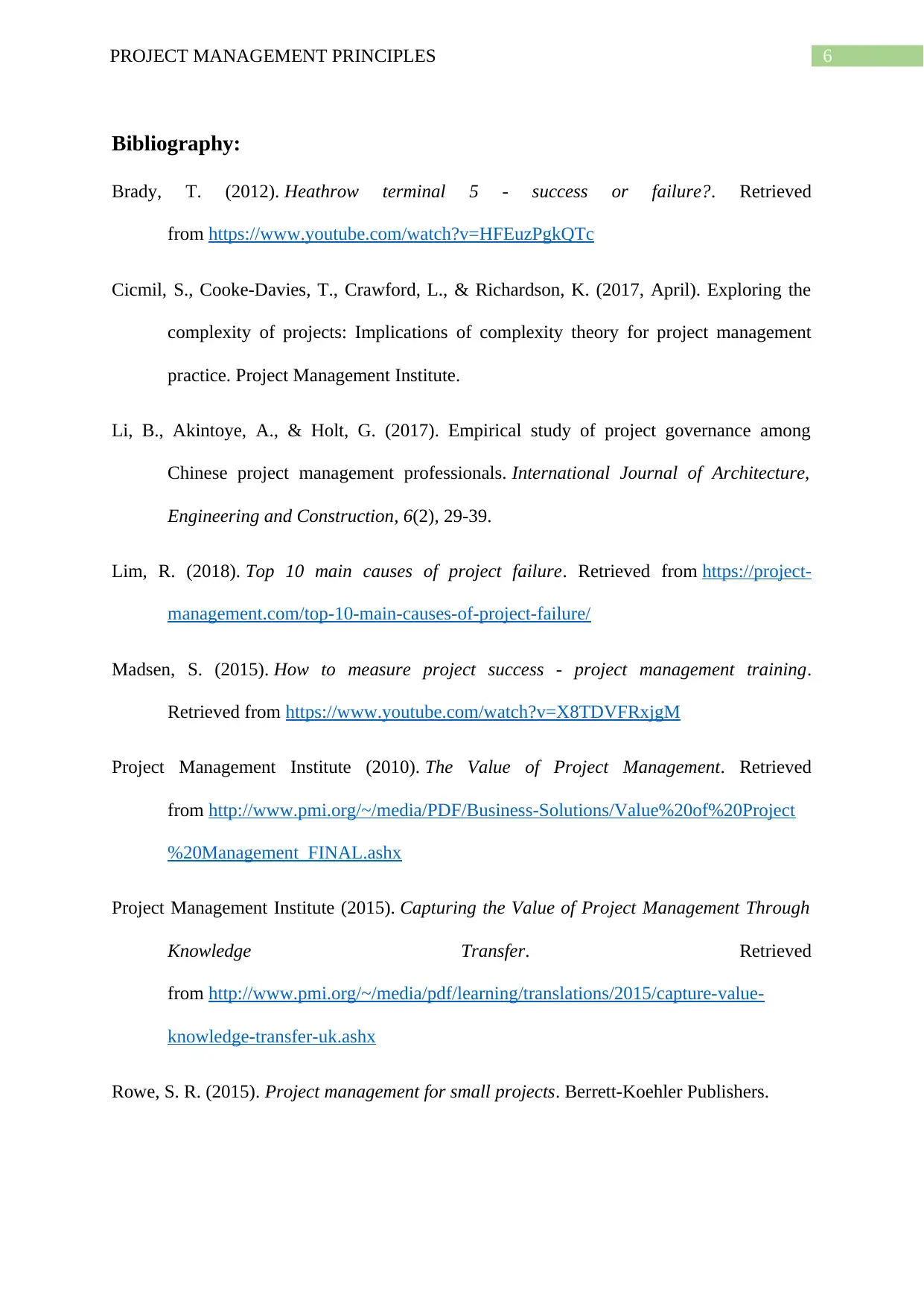
6PROJECT MANAGEMENT PRINCIPLES
Bibliography:
Brady, T. (2012). Heathrow terminal 5 - success or failure?. Retrieved
from https://www.youtube.com/watch?v=HFEuzPgkQTc
Cicmil, S., Cooke-Davies, T., Crawford, L., & Richardson, K. (2017, April). Exploring the
complexity of projects: Implications of complexity theory for project management
practice. Project Management Institute.
Li, B., Akintoye, A., & Holt, G. (2017). Empirical study of project governance among
Chinese project management professionals. International Journal of Architecture,
Engineering and Construction, 6(2), 29-39.
Lim, R. (2018). Top 10 main causes of project failure. Retrieved from https://project-
management.com/top-10-main-causes-of-project-failure/
Madsen, S. (2015). How to measure project success - project management training.
Retrieved from https://www.youtube.com/watch?v=X8TDVFRxjgM
Project Management Institute (2010). The Value of Project Management. Retrieved
from http://www.pmi.org/~/media/PDF/Business-Solutions/Value%20of%20Project
%20Management_FINAL.ashx
Project Management Institute (2015). Capturing the Value of Project Management Through
Knowledge Transfer. Retrieved
from http://www.pmi.org/~/media/pdf/learning/translations/2015/capture-value-
knowledge-transfer-uk.ashx
Rowe, S. R. (2015). Project management for small projects. Berrett-Koehler Publishers.
Bibliography:
Brady, T. (2012). Heathrow terminal 5 - success or failure?. Retrieved
from https://www.youtube.com/watch?v=HFEuzPgkQTc
Cicmil, S., Cooke-Davies, T., Crawford, L., & Richardson, K. (2017, April). Exploring the
complexity of projects: Implications of complexity theory for project management
practice. Project Management Institute.
Li, B., Akintoye, A., & Holt, G. (2017). Empirical study of project governance among
Chinese project management professionals. International Journal of Architecture,
Engineering and Construction, 6(2), 29-39.
Lim, R. (2018). Top 10 main causes of project failure. Retrieved from https://project-
management.com/top-10-main-causes-of-project-failure/
Madsen, S. (2015). How to measure project success - project management training.
Retrieved from https://www.youtube.com/watch?v=X8TDVFRxjgM
Project Management Institute (2010). The Value of Project Management. Retrieved
from http://www.pmi.org/~/media/PDF/Business-Solutions/Value%20of%20Project
%20Management_FINAL.ashx
Project Management Institute (2015). Capturing the Value of Project Management Through
Knowledge Transfer. Retrieved
from http://www.pmi.org/~/media/pdf/learning/translations/2015/capture-value-
knowledge-transfer-uk.ashx
Rowe, S. R. (2015). Project management for small projects. Berrett-Koehler Publishers.
Paraphrase This Document
Need a fresh take? Get an instant paraphrase of this document with our AI Paraphraser
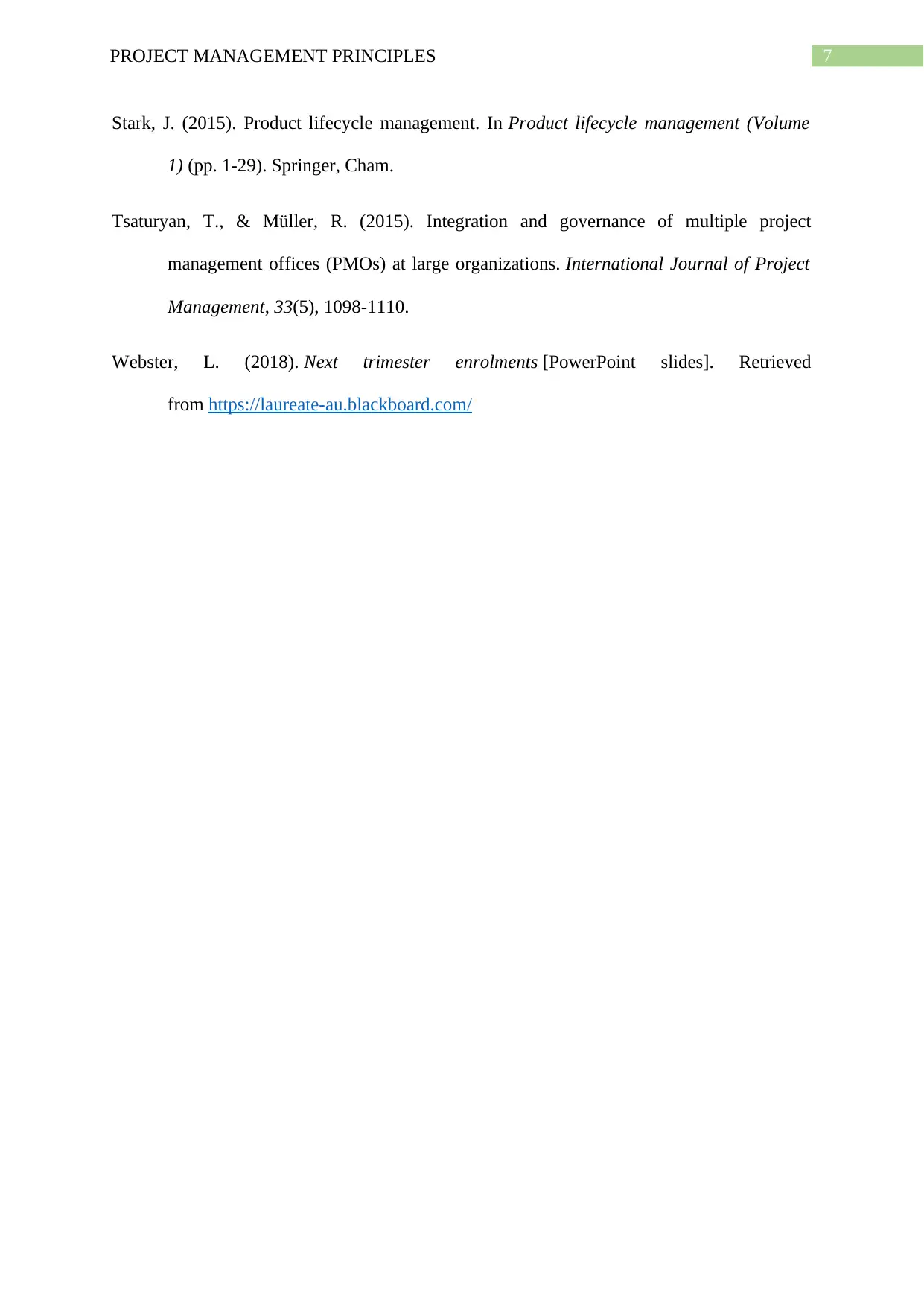
7PROJECT MANAGEMENT PRINCIPLES
Stark, J. (2015). Product lifecycle management. In Product lifecycle management (Volume
1) (pp. 1-29). Springer, Cham.
Tsaturyan, T., & Müller, R. (2015). Integration and governance of multiple project
management offices (PMOs) at large organizations. International Journal of Project
Management, 33(5), 1098-1110.
Webster, L. (2018). Next trimester enrolments [PowerPoint slides]. Retrieved
from https://laureate-au.blackboard.com/
Stark, J. (2015). Product lifecycle management. In Product lifecycle management (Volume
1) (pp. 1-29). Springer, Cham.
Tsaturyan, T., & Müller, R. (2015). Integration and governance of multiple project
management offices (PMOs) at large organizations. International Journal of Project
Management, 33(5), 1098-1110.
Webster, L. (2018). Next trimester enrolments [PowerPoint slides]. Retrieved
from https://laureate-au.blackboard.com/
1 out of 8
Related Documents
Your All-in-One AI-Powered Toolkit for Academic Success.
+13062052269
info@desklib.com
Available 24*7 on WhatsApp / Email
![[object Object]](/_next/static/media/star-bottom.7253800d.svg)
Unlock your academic potential
Copyright © 2020–2026 A2Z Services. All Rights Reserved. Developed and managed by ZUCOL.




